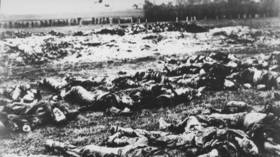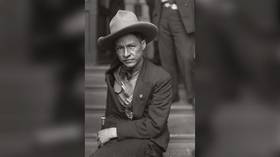The Wild East: Inside the Russian-Chinese gold-rush 'California' where women were banned and fortunes were quickly made and lost
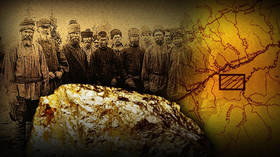
Hardened criminals, valiant adventurers, thrill seekers, and thousands of gold prospectors from all over the world flocking to a new virgin territory, where a young republic of free people is being born amid the glow of gold mines.
No, this is not a reference to the American Wild West – what we’re talking about happened on the other side of the Pacific, on Chinese land beyond the Amur River, where a Russian Klondike blossomed in the 19th century. Local residents mined minerals, snubbed governments, and had their own flag, leaders, and laws. They called their new homeland the 'Zheltuga Republic.'
Klondike in the Far East – how it all started
The Russians made it to the Amur as early as the 17th century. Eventually, their dramatic clashes with local tribes and politicians that paid tribute to China led to the drawing of a border between the Russian and the Manchu states. In the 19th century, this frontier followed the Amur River. But neither St. Petersburg nor Beijing could effectively control the vast and sparsely populated areas on the outskirts of their empires.
In the spring of 1883, a member of the indigenous Evenk people, who lived on the southern, ‘Chinese’ bank of the Amur, was going about the sad but rather prosaic business of burying his mother. As he was digging her grave, he found several gold nuggets. He realized there was some money to be made, so he went to the border village of Ignashino on the Russian side of the Amur. This tiny village still exists today, although it has less than 200 residents. With Blagoveshchensk (216,000 people) roughly 500 kilometers to the southeast and Nerchinsk (population 15,000) about the same distance to the southwest, there is still nothing that could be called a big city close by.
The locals knew that Evenk man, who would sometimes come to the village to sell hides. He found a merchant called Seredkin and, in exchange for a payment, told him where the gold could be found. Seredkin sent a mining engineer to the south bank of the Amur and he found a rich goldfield close to the Mohe river, which the Russians called the ‘Zheltuga’. The first teams of prospectors were soon to follow.
In the winter of 1884, a rumor swept through Siberian towns about untold riches to be found on the Zheltuga. As it usually happens, imagination was conjuring up images of a new Eldorado. A good reflection of everyone’s sentiment was a phrase coined back then: “You peel off moss and pick up gold.” People from as far as Nerchinsk, Chita, Irkutsk, Blagoveshchensk, and even Sakhalin volunteered to travel to the Zheltuga, not to mention residents of villages along the Argun and the Amur.
Naturally, prospectors were followed by merchants and then by all sorts of robbers and con men. In early 1883, a mere 120 people lived on the Zheltuga; a year later, that number went up to 7,000 and it peaked between 10,000 and 15,000. Admittedly, all of these figures are approximate and different estimates have been made. The fact remains, however, that the Zheltuga valley rapidly became very populous, with the Russians far outnumbering the Chinese, who were also drawn to the area by rumors of gold.
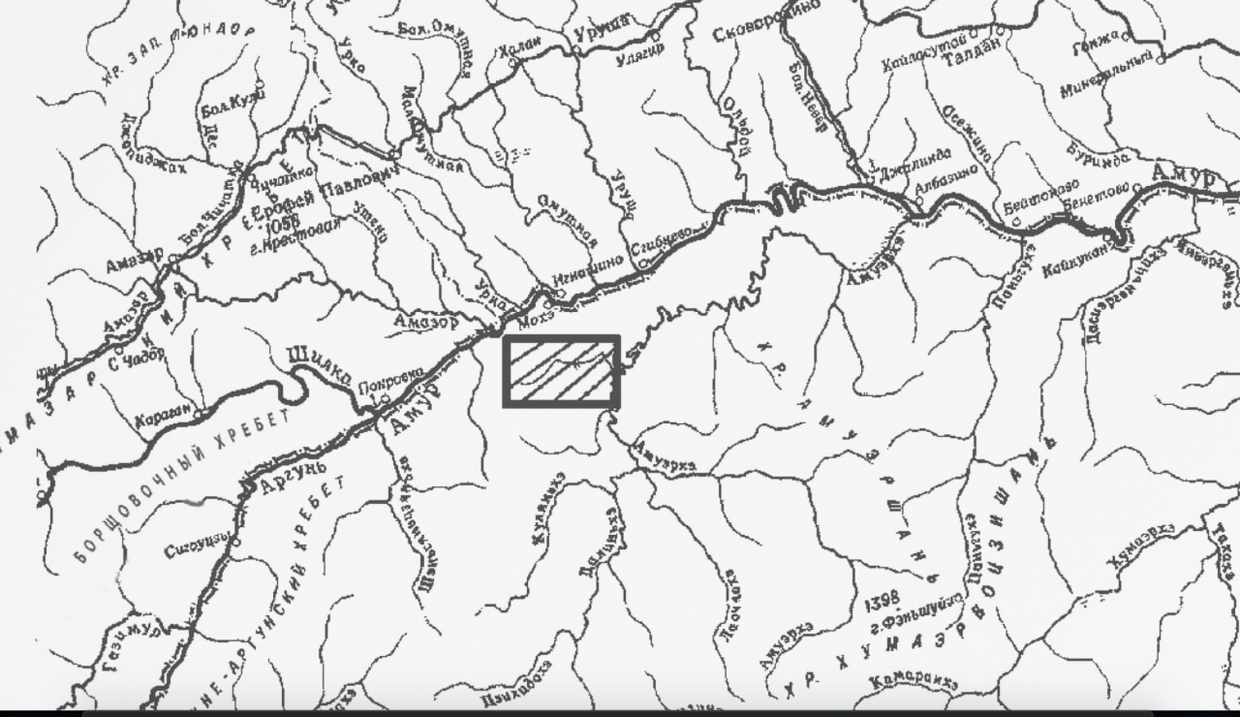
Although the gold rush was felt even by some government officials and intellectuals, it stands to reason that most of those flocking to the Zheltuga were no church choir boys. At best, they were ordinary workers and peasants who gave up their primary occupations, at worst – escaped convicts and deserters. A correspondent from the Peterburgskie Vedomosti described them as “desperate villains.” There were some remarkable characters among them, like a guy who managed to escape from prison on Sakhalin, cross the sea, and walk 1,500 kilometers to get to the goldfields.
Apart from Russians and Chinese, the Zheltuga valley saw the arrival of Americans, Jews, Germans, Frenchmen, Poles, and members of all kinds of Siberian peoples. You could run into anyone here, from a branded highwayman to an impoverished aristocrat. That ragtag community mainly relied on the Russian language and sometimes used Chinese or the Kyakhta Russian-Chinese pidgin.
Most of those people were actually prospectors, or ‘predators’, as they were called then. Around 100-150 newcomers would arrive in Zheltuga every day.
Life in Russian California
Community life centered around California, which is what they called the rapidly growing mining village, whose main street was known as Million Street. Its name was, however, more impressive than its architecture. People lived in simple and practical log cabins chinked with moss under flat timber roofs covered with dirt. Local carpenters built a whole lot of huts like that, which ordinarily had an area of 72 square meters and a ceiling height of just 2 meters. There was a wood stove in the middle without a chimney and bunk beds lined up against the walls. The gold-seekers’ diet consisted mostly of rice and other grains, game, fish, and berries. The dwellings were very primitive but they were only used as sleeping quarters. Chinese prospectors’ houses stood apart from the rest, and they conducted their mining activities on their own.
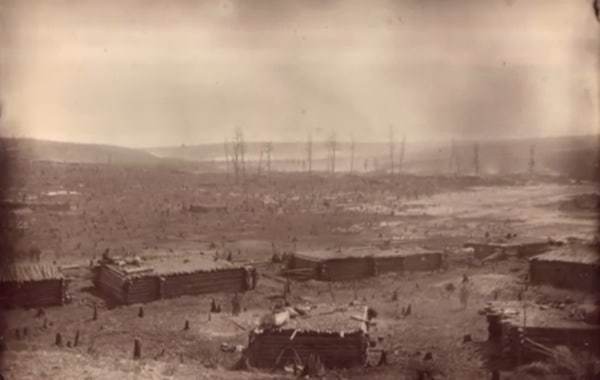
There was a large square in the middle of California, called Orlovo Pole (Eagle Field), used for town meetings. It was the location of the mining administration and had a rostrum, a bell, and even a black and yellow flag. The black color symbolized earth, while yellow stood for gold.
Beyond California, mining pits stretched along the Zheltuga for about 15 kilometers. Some belonged to teams, others to individual prospectors. In Zheltuga’s heyday, there were over 700 teams and countless individual gold-seekers. Some of them made money and went back home spreading the word about the gold country, but others rushed in to take their place.
After the topsoil was removed, miners worked through the gold-bearing layer and continued prospecting in underground galleries. Exploration was usually abandoned when you reached your neighbors’ galleries. Gold mining was mainly carried out in winter when the pits were not flooded.
Gold digging was equally lucrative for those who served the miners. Stores, mostly selling food and tools, bathhouses, gambling houses, and taverns were booming as they charged locals for a pickaxe or a piece of dry bread several times as much as in Blagoveshchensk. California could boast 18 hotels and inns, 22 taverns, a photo lab, a zoo with a female tiger, a musical theater, two orchestras, two jewelry shops, a choir, seven bathhouses, a hospital, and a pharmacy. Pure gold was used as a means of exchange due to a shortage of banknotes and coins.
Chita, the local casino, which some wisecrackers called Monte Carlo, was California’s epitome of grandeur. It had several halls dedicated to specific games, from roulette to dice and faro. The casino had its own orchestra and a café. In reality, the owners of such establishments were the ones who were breaking the bank, while many prospectors simply gambled and drank away their fortunes.
Gold dealers were another group of local big shots. One of them was executed for fraud. After he circulated a fake wire about the imminent arrival of a Cossack squad, he was able to buy a lot of gold on the cheap and ruined many prospectors. The perpetrator was flogged to death.
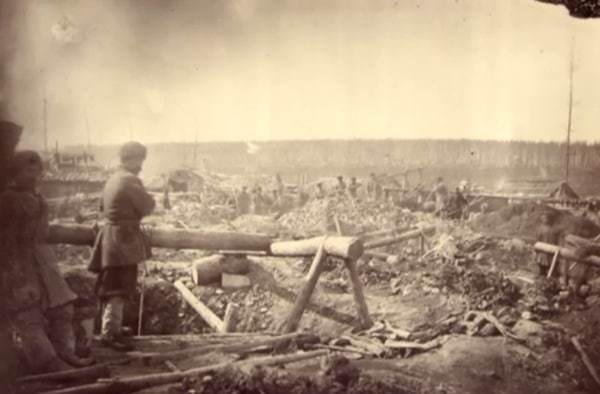
One thing they didn’t have, by the way, was brothels. The Zheltuga Republic had a rule against inviting women. The miners, mostly no gentlefolk themselves, were afraid that the presence of the fair sex would result in a spike of incidents, brawls, and murders. Out of similar concerns, the selling of liquor was prohibited in the places where actual mining took place. So-called 'alcohol carriers' tried to circumvent this ban though, much to the joy of workers, who were suffering from freezing cold.
Zheltuga had important implications for the economy of the whole region. It’s hard to grow wheat in the Far East under normal circumstances, and field workers started leaving in droves to go looking for gold. As a result, the prices of food and other consumer goods in Chita, Nerchinsk, and Irkutsk skyrocketed. The local authorities’ attempts to stem migration were ineffective.
It was all completely illegal. Moreover, Russian prospectors were technically on Chinese territory, so they worked without a break trying to get as much done as possible before the two governments took notice. The Chinese, however, were happy to turn a blind eye for a while because locally-mined gold was mostly sold to Chinese dealers.
Republic of the free
Zheltuga started out as a pure anarchy. Soon enough, however, the 'Californians' thought they needed an administration of some kind.
At one point, the cook of one of the teams was killed with a hammer because the murderers wanted to get their hands on his gold stash. The Zheltuga community swiftly responded by electing a leader who would be responsible for law and order. The residents took an oath where they pledged to follow Christian principles and civil laws. Here’s the text of this oath:
“We, the teams and owners of free enterprises in Amur, California, remembering the words bestowed upon us by our great teacher the Son of God and Our Lord, ‘Thou shalt love thy neighbor as thyself’ and following this Christian teaching contained in the Holy Gospel, which leads us to peace and welfare in this worldly life and salvation and eternity in the kingdom of heaven, do undertake, with the help of the Almighty, to labor relentlessly for the benefit of our neighbors in order to show the departed the true path and, by doing so, to banish ungodly deeds which are committed by many from our midst who are wandering in the darkness of sin and have forgotten the commandments ‘Thou shalt not kill’ and ‘Thou shalt not steal’. Sending our heartfelt prayers to Our Lord so that He may not abandon us, weak as we are, on the hard path that is set for us, we place our unmitigated trust and deliver ourselves into the hands of our elected officials not as power-coveting superiors but as the worthiest people among us who remember the word of God teaching us truth and justice, which we have confirmed with our signatures and, in our thoughts, with this oath.”
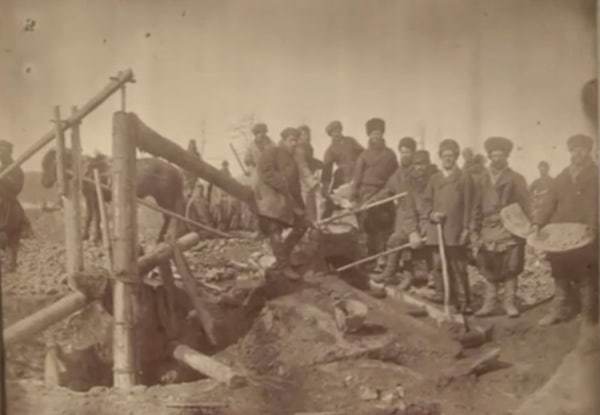
All the mines were divided into five districts, each of which elected two foremen resulting in a ‘parliament’ of sorts, which consisted of two Chinese men and eight Russians.
Curiously, there are still questions about the identity of the first elected ‘president’ (yes, this is the word they used) of the Zheltuga Republic. Historians generally agree that he was a foreigner, but his exact origin remains a mystery.
It is traditionally said that the first president of the Zheltuga Republic was Karl Ivanovich Fasse, who most researchers believe to be an Italian. Other sources claim he was an Austro-Hungarian subject born in Slovakia. According to one version, Fasse, whoever he was, came to the Amur not straight from his home country but from the ‘original’ California in the US. Another version maintains that he graduated from a law school in the Austro-Hungarian Empire and worked as a government official in Vladivostok before showing up in Zheltuga. In any case, he appears to have been an educated man, and speculations about his legal and bureaucratic background are not unfounded. A popular story about how the Zheltuga Republic was run by the so-called Cornet Savin, a famous con man, seems to be a hoax that goes against the facts.
The president and foremen were paid for their work. In addition, everyone chipped in to pay for a free 'republican' hospital, a treasurer, and the fire and police services. The foremen were also the court of first instance, while more serious cases could be appealed before the president. The republic’s legislation was quite unsophisticated and mostly dealt with four areas: taxes and payments for the common good, the procedure for staking and using claims, the organization of trade and other activities, and criminal law.
The latter was simple and easy to grasp. Minor crimes, such as stealing, sodomy, bringing women to the mines, disturbing the peace while being drunk, cheating at card games, etc., were punished by a certain, but always considerable, number of blows with a rod or a cane. Those guilty of murder or other serious crimes were hanged. Smaller offenses like breaking work rules that didn’t lead to grave consequences were punishable by a fine. The measures proved to be effective in maintaining order.
The tax on retailers was 10% of the price of goods, and this figure went up to 25% for sellers of liquor. Establishment owners paid 20% of their monthly revenue in taxes.
China puts an end to Russian Eldorado
That idyllic situation was short-lived. In 1884, China demanded that Baron Korf, the governor general of Amur, take steps to bring Russians back to the north bank of the Amur. Russian officials shrugged and said they were powerless because they were not authorized to operate on Chinese soil. The debate around what to do with Zheltuga and whose responsibility it was lasted for years.
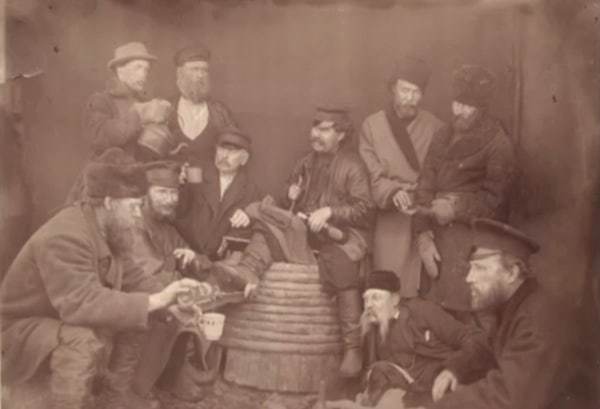
The checkpoints put up by Russian authorities along the border didn’t really do much. One has to assume that the officials in charge liked gold no less than everyone else. The Chinese governor was essentially told by his Russian counterpart to do whatever he pleased – on his own. His predicament was that California was separated from the closest Chinese settlements by 500 kilometers of taiga. Even getting through that forest to the colony of thousands of people was a huge problem, let alone dispersing the prospectors.
In August 1885, a Chinese official came to Zheltuga to tell gold-seekers to leave within a week. That sounded serious, so many decided not to play with fire and go back to Russia. Many others, however, relocated to the nearest Russian villages of Ignashino and Amazar to see if they could wait this out. Some even remained in California.
On September 6, 1885, 700 Chinese soldiers showed up to the Russian colony. They burned houses and killed several people, but when they left thinking their mission was accomplished, Zheltuga prospectors came back, rebuilt California, and went on with their work as if nothing had happened.
A new squad was dispatched to punish intruders two months later, in November 1885. This time, the Qing sent 1,600 troops. Californians were divided about what to do, with some arguing for a final stand and some deciding to go back home. Russian prospectors were leaving in parties of up to 100 people. The Chinese squad severely punished Chinese miners while mostly refraining from violence against Russians. Those few who dared return were intercepted by the Chinese and got a beating with bamboo rods.
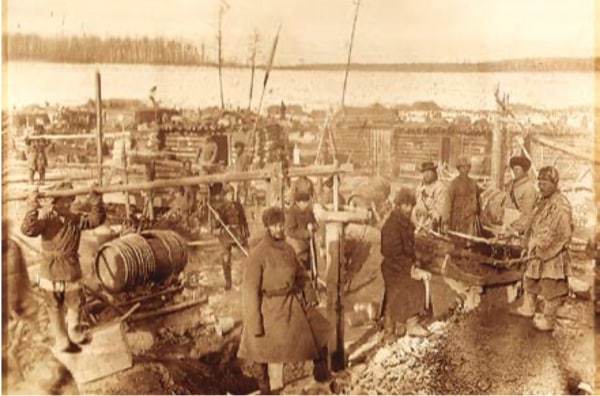
Prospectors tried digging along the whole of the Amur’s Russian side as well, but they couldn’t compete with big Russian gold mining companies supported by soldiers and Cossacks. Still, 'predatory' gold mining continued until the 1930s, when Soviet authorities finally suppressed illegal exploration.
The Zheltuga Republic only existed for two years, but it left an interesting legacy in Russian memory. It was a moment when a group of rough but enterprising people, acting very quickly, managed to turn a gang of outcasts into a functioning, self-governing civil society united by a sense of common purpose, which made officials in St. Petersburg and Beijing take notice. This commune became not just a symbol of enrichment but a symbol of freedom as well.

